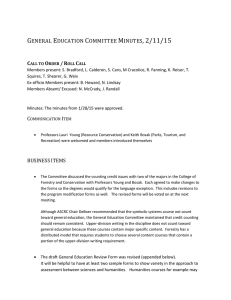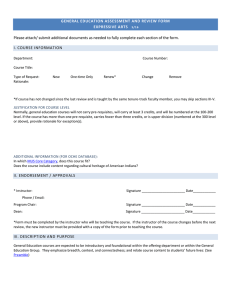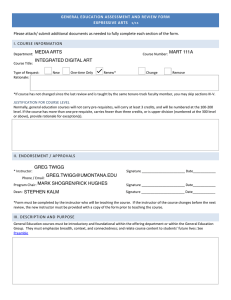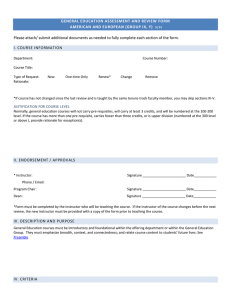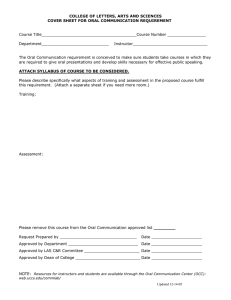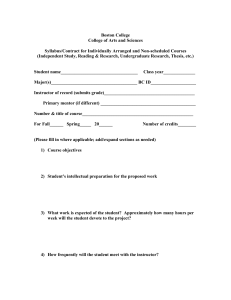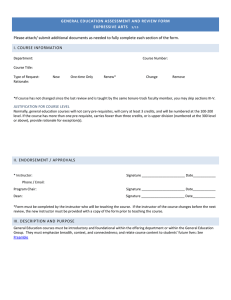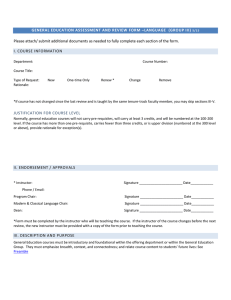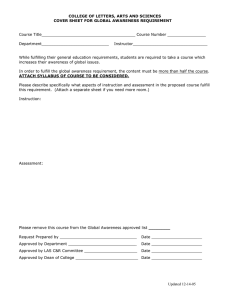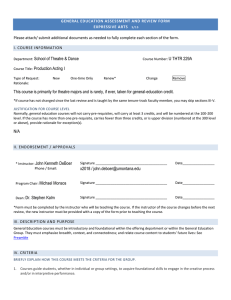GENERAL EDUCATION ASSESSMENT AND REVIEW FORM – NATURAL SCIENCE (GROUP... Please attach/ submit additional documents as needed to fully complete... I. COURSE INFORMATION
advertisement
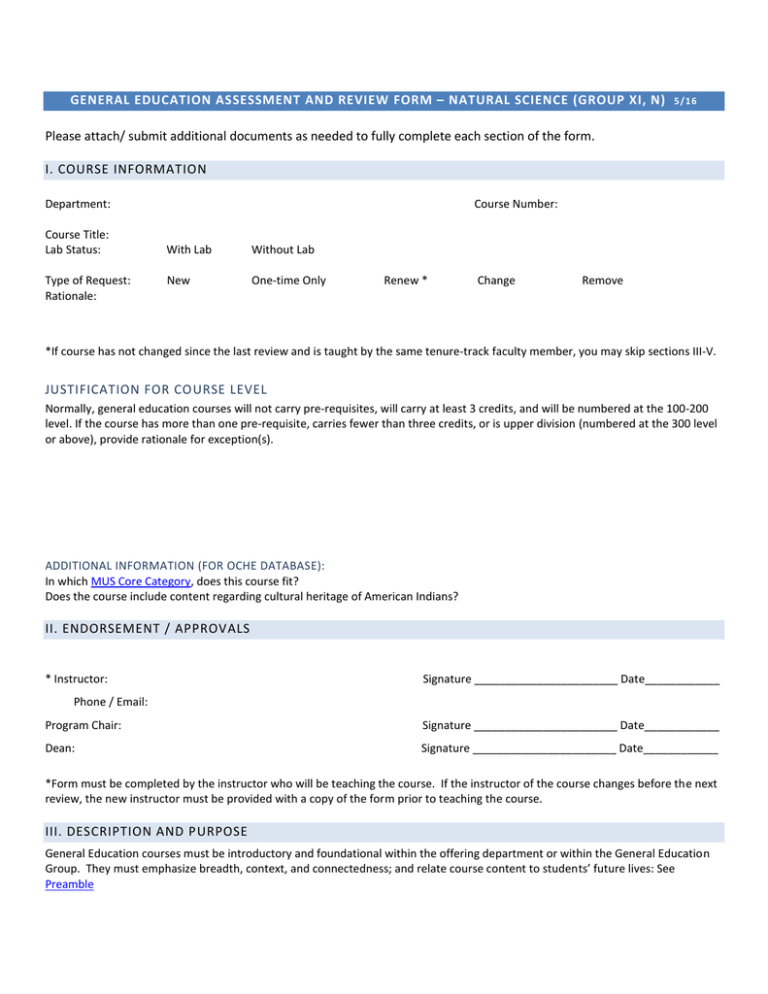
GENERAL EDUCATION ASSESSMENT AND REVIEW FORM – NATURAL SCIENCE (GROUP XI, N) 5/16 Please attach/ submit additional documents as needed to fully complete each section of the form. I. COURSE INFORMATION Department: Course Title: Lab Status: Type of Request: Rationale: Course Number: With Lab Without Lab New One-time Only Renew * Change Remove *If course has not changed since the last review and is taught by the same tenure-track faculty member, you may skip sections III-V. JUSTIFICATION FOR COURSE LEVEL Normally, general education courses will not carry pre-requisites, will carry at least 3 credits, and will be numbered at the 100-200 level. If the course has more than one pre-requisite, carries fewer than three credits, or is upper division (numbered at the 300 level or above), provide rationale for exception(s). ADDITIONAL INFORMATION (FOR OCHE DATABASE): In which MUS Core Category, does this course fit? Does the course include content regarding cultural heritage of American Indians? II. ENDORSEMENT / APPROVALS * Instructor: Signature _______________________ Date____________ Phone / Email: Program Chair: Signature _______________________ Date____________ Dean: Signature _______________________ Date____________ *Form must be completed by the instructor who will be teaching the course. If the instructor of the course changes before the next review, the new instructor must be provided with a copy of the form prior to teaching the course. III. DESCRIPTION AND PURPOSE General Education courses must be introductory and foundational within the offering department or within the General Education Group. They must emphasize breadth, context, and connectedness; and relate course content to students’ future lives: See Preamble IV. CRITERIA BRIEFLY EXPLAIN HOW THIS COURSE MEETS THE CRITERIA FOR THE GROUP. 1. Courses explore a discipline in the natural sciences and demonstrate how the scientific method is used within the discipline to draw scientific conclusions: 2. Courses address the concept of analytic uncertainty and the rigorous process required to take an idea to a hypothesis and then to a validated scientific theory; 3. Lab courses engage students in inquiry-based learning activities where they formulate a hypothesis, design an experiment to test the hypothesis, and collect, interpret, and present the data to support their conclusions. V. STUDENT LEARNING GOALS BRIEFLY EXPLAIN HOW THIS COURSE WILL MEET THE APPLICABLE LEARNING GOALS. 1. Understand the general principles associated with the discipline(s) studied. 2. Understand the methodology and activities scientists use to gather, validate and interpret data related to natural process. 3. Detect patterns, draw conclusions, develop conjectures and hypotheses, and test them by appropriate means and experiments. 4. Understand how scientific laws and theories are verified by quantitative measurement, scientific observation, and logical/critical reasoning. 5. Understand the means by which analytic uncertainty is quantified and expressed in the natural sciences. VI. ASSESSMENT A. HOW ARE THE LEARNING GOALS FOR THE GENERAL E DUCATION GROUP MEASU RED? Describe how you will determine that students have met each of the General Education Learning Goals. This should include specific examples of assignments, rubrics or test questions that directly measure the General Education learning goals. (See Example) Please attach or provide a web link to relevant assessment materials. 6. Understand the general principles associated with the discipline(s) studied. 7. Understand the methodology and activities scientists use to gather, validate and interpret data related to natural process. 8. Detect patterns, draw conclusions, develop conjectures and hypotheses, and test them by appropriate means and experiments. 9. Understand how scientific laws and theories are verified by quantitative measurement, scientific observation, and logical/critical reasoning. 10. Understand the means by which analytic uncertainty is quantified and expressed in the natural sciences. A General Education Assessment Report will be due on a four-year rotating cycle. You will be notified in advance of the due date. This will serve to fulfill the University’s accreditation requirements to assess general education and will provide an opportunity to connect with your colleagues across campus and share teaching strategies. Items VI.B- D will be helpful in compiling the report. B. ACHIEVEMENT TARGETS [This section is optional. Achievement targets can be reported if they have been established.] Describe the desirable level of performance for your students, and the percentage of students you expected to achieve this: 1. 2. 3. C. ASSESSMENT FINDINGS [This section is optional. Assessment findings can be reported if they are available.] What were the results/findings, and what is your interpretation/analysis of the data? (Please be detailed, using specific numbers/percentages when possible. Qualitative discussion of themes provided in student feedback can also be reported. Do NOT use course grades or overall scores on a test/essay. The most useful data indicates where students’ performance was stronger and where it was weaker. Feel free to attach charts/tables if desired.) D. ASSESSMENT FEEDBACK [This section is optional. Assessment feedback can be reported if it is available.] Given your students’ performance the last time the course was offered, how will you modify the course to enhance learning? You can also address how the course could be improved, and what changes in the course content or pedagogy you plan to make, based upon on the findings. Please include a timeframe for the changes. VII. SYLLABUS AND SUBMISSION Please submit syllabus in a separate file with the completed and signed form to the Faculty Senate Office, UH 221. The learning goals for the Natural Science Group must be included on the syllabus. An electronic copy of the original signed form is acceptable.
